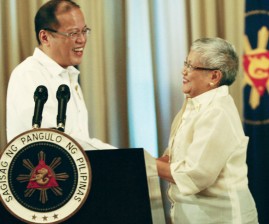
PEACE PROGRESS President Aquino and his adviser on the peace process, Secretary Teresita Quintos-Deles, exchange pleasantries following an official announcement that the government and the Moro Islamic Liberation Front have agreed on a road map aimed at ending decadeslong separatist insurgency in Mindanao. EDWIN BACASMAS
Muslim and Roman Catholic leaders on Monday hailed the preliminary agreement between the government and the Moro Islamic Liberation Front (MILF) to end four decades of war by creating a Moro homeland in Mindanao.
President Benigno Aquino announced the “framework agreement” on Sunday, saying the deal cleared the way for a “final and enduring peace in Mindanao.”
Basilan Bishop Martin Jumoad on Monday said he welcomed the agreement, which he described as a “small step to peace.”
“We have suffered a lot and any small step to peace is a sign of hope for peace,” Jumoad said.
He said the preliminary agreement was good so long as the basis for negotiations was the Constitution.
He added, however, that agreements between the government and the MILF should be submitted to the people for their approval in a plebiscite.
Self-determination
Jaafar Ali, leader of the Darul Ifta (House of Opinion) and founding chair of the National Ulama (Islamic preachers) Council of the Philippines (NUCP), said the preliminary agreement “guaranteed the Bangsamoro people to freely exercise their right to self-determination.”
“It may take some time but at least now we are certain that this government recognizes our people’s dream of self-governance,” Ali said.
Mayor Tocao Mastura of Sultan Kudarat said Muslims in Mindanao would remember President Aquino as the “instrument” in the achievement of their desire for self-determination.
Making history
“President Aquino has achieved . . . history . . . [with this] great breakthrough [toward] peace in Mindanao, [the] Bangsamoro people will never forget that,” said Mastura, whose town hosts the biggest MILF camp in Maguindanao province.
Cotabato City Vice Mayor Muslimin Sema, chairman of a faction of the Moro National Liberation Front (MNLF) which, in 1996, forged a peace agreement with the government, also welcomed the framework agreement.
“We hope there could be some integration so all the Bangsamoro people will benefit from the dividends of the peace agreement,” he said.
Sema, who is running for reelection in next year’s local elections, said many residents of Cotabato favored the integration of the city into the new political entity, Bangsamoro.
Let people decide
Cotabato City is the seat of the Autonomous Region in Muslim Mindanao (ARMM), which Bangsamoro would replace as envisioned in the agreement.
“Let the people decide freely through a plebiscite,” said Cotabato City Councilor Wilfrido Bueno, an election lawyer.
Cotabato Archbishop Orlando Quevedo said most people in his archdiocese received President Aquino’s announcement of the framework agreement for peace in Mindanao as good news.
Quevedo is a supporter of the peace process and self-determination for the Moro, or Bangsamoro, as Filipino Muslims refer to themselves.
Auxiliary Cotabato Bishop Jose Colin Bagaforo said the bureaucratic reforms being instituted in the ARMM should continue “and whatever plans related to peace and development and others concerning expanding Muslim Mindanao should get the nod of the affected inhabitants.”
Other sectors
Quevedo urged the government and the MILF peace panels not to disregard other sectors in Mindanao, the non-Muslims and the indigenous peoples.
North Cotabato Gov. Emmylou Mendoza said she, too, welcomed the framework agreement.
About six villages in North Cotabato’s Muslim-majority areas may decide to become part of Bangsamoro.
“There’s no problem with that because the people will be asked in a plebiscite and their voices will be heard,” Mendoza said.
Referendum guarantee
The “referendum guarantee” in the agreement made many local officials, previously opposed to the integration of their communities into the proposed expanded autonomous region without a plebiscite, support the peace process.
Former North Cotabato Gov. Emmanuel Piñol said forced integration was the bone of contention when he took the Arroyo administration’s proposed peace deal with the MILF to Supreme Court in 2008.
“Now, under President Aquino’s open governance, I’m for it, but the people, especially those directly affected by the expansion should be properly informed before coming up with a wise decision in a referendum,” Piñol, whose native town of Mlang, will also be affected.
“Moro-dominated villages should not be coerced to vote. Every citizen regardless of tribe, creed and political affiliation should be free to choose and express their individual sentiment on the issue,” he said.
In Basilan, Isabela City Mayor Cherrylyn Akbar said she wanted to read the framework agreement first before commenting on the proposed integration of the city into Bangsamoro.
Easing of tensions
The Commission on Elections (Comelec) on Monday said the preliminary agreement would help to ease tensions in the ARMM.
“[The agreement] should lessen the tension there for the ARMM elections now that they know they are expanding,” Comelec Chairman Sixto Brillantes Jr. said.
Brillantes predicted that with or without the agreement, the balloting in the ARMM would be the most peaceful in the region’s history.
“[T]he factions there are already making peace with each other,” Brillantes said.
No effect on elections
He said the breakthrough in the peace negotiations between the government and the MILF would not affect the Comelec’s preparations for elections in the ARMM.
The ARMM will not be immediately dissolved, he said, as a law must first be passed to create Bangsamoro. And then there will be a plebiscite that the Comelec will oversee.
“This will all happen after the 2013 elections,” Brillantes said. With reports from Edwin Fernandez, Charlie Señase and Julie Alipala, Inquirer Mindanao